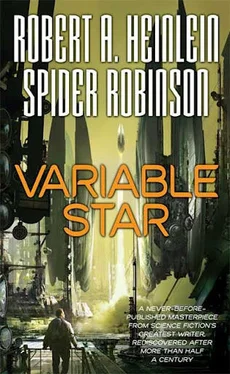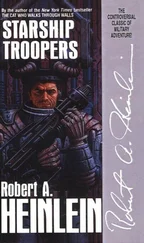“Gene’s twin sister Terry was behind Jupiter. She had time to know what she was seeing. Poor woman. The times match. Doom arrived from Solward at lightspeed. QED.”
I’d forgotten I had already worked that out, back in the autodoc. Another ill-considered question, in any event.
Solomon said, “The specks of data we do have indicate that conversion of Sol’s mass to energy was at least ninety percent efficient, and could have been perfect.”
If there is an intelligent response to that statement, none of us found it.
“Is there a consensus guess what went wrong, even?” I tried finally. The smell of fresh coffee filled the room.
Solomon snorted. “First, we have to settle how many angels can dance their way into a pinhead.”
“Solomon—” Pat began.
Herb said, “He’s saying it’s a religious question.”
Pat looked scandalized.
“Exactly,” Solomon agreed. “Everybody is going to end up with a firm opinion, based on intuition, but nobody’s going to be able to defend his. The first scraps of actual hard data aren’t going to catch us for years to come. And I doubt they’ll settle anything. I don’t think the question will be answerable in my lifetime. Except on faith.”
“I just hate to even use the word ‘religion’ in this context,” Pat said. “It makes my skin crawl.”
“Occam’s Razor,” Herb said, bringing me my Irish coffee. He’d made one for himself as well.
“What?” Pat asked.
“We forgot Occam’s Razor,” Herb said.
“I don’t follow.” I could see that Solomon did.
Herb sat and drank some of his coffee. “The sky has always been full of things we can’t explain,” he said. “It still is. Anomalies always abound. Gamma ray bursts. Missing matter. Quasars. Dozens of things. Generations of astrophysicists have made careers creating different, complicated explanations for each of them—often brilliantly. But one explanation for all of them, a quite likely one, they have never once considered. Or at least, anyone who did propose it instantly lost all credibility.”
“Oh, Herb, no!”
He nodded. “Intelligent design.”
Pat tried to speak, but could only sputter.
“That’s exactly why, too,” Herb said. “For some reason, we let the god-botherers appropriate that term as a euphemism for their stupid deities, and let our revulsion for the latter cloud our understanding of the former.”
Solomon spoke up. “He’s right, Pat. Once you get over the baseless idea that an intelligent designer must necessarily be God, it gets easier to deal with. Nothing whatsoever except a lot of dead fools says an intelligent designer has to be omnipotent—just more powerful than us. He need not necessarily be omniscient—just smarter than us.”
Herb said, “And God Himself knows there is no reason why an intelligent designer must—or even can—be omnibenevolent. He need not even be as nice as us. And we’re swine with starships.”
Pat’s mouth hung open. Perhaps mine did, too.
“And finally,” Solomon said, “nothing says there has to be only one—or even some low prime number.”
“We found sentient life on Mars and Venus,” Herb said. “But nothing at all outside the System. And the Martians and Venerian dragons were just so… irrelevant to us, it was easy to stop thinking about them. Even after we got bright enough to go out and look for ourselves, more than a dozen times in a row we found whole star systems containing nothing more complicated than a cat. For some reason, we concluded our star system must be unique. We got the notion we were the only sentients in the Galaxy. We should have seen how preposterous that was, and looked for more reasonable explanations.”
“I really really really hate this,” Pat told him.
“Exactly our problem. Hate does not add clarity.”
I felt a powerful inexplicable impulse to put some music on. It would make us all feel better. I summoned up my library on my desk display and was going to choose one of my favorite old jazz records, a Charlie Haden/Gonzalo Rubalcaba collaboration that had never failed to soothe me when I needed it. But before I could start it, the album title sunk in. It was called La Tierra del Sol.
And every song on it had been written by a dead man, to whom it was a posthumous tribute.
I cleared the screen. So much for the power of music. I had thousands of other albums available, but suddenly I didn’t want to hear any music by dead men. I wondered if the next time I picked up my horn, any sound would come out.
“Why can’t it have been a natural occurrence?” Pat was saying. “It seems to me that would be Occam’s Razor. Occam’s Razor says don’t multiply entities unnecessarily. Which is less likely? One single cosmic event we can’t explain yet? Or a galaxy full of lethal monsters, hiding perfectly, explaining dozens of astrophysical mysteries at once?”
“What does Matty say?” I asked.
The silence told me I was still asking bad questions.
“Aw, shit —”
“Don’t be mad at him, Joel,” Solomon said. “He spent every minute of the last six and a half years praying to a God I happen to know he didn’t even believe in that he was wrong, that nothing was wrong with the sun. But he knew he wasn’t; that’s why he came apart. The measurements he lucked onto as we were leaving told him something unprecedented and scary was going on. He was too good at what he did to be wrong. Having it confirmed was just too much.”
He was right: Matty had hinted about this to me, more than once. Something about a perfect solar eclipse by Terra occurring as we’d left the System, and something wrong about the predicted displacement of some stars behind Sol. Whatever had happened—or been done—to our star had taken six or more years to finish happening. The few subtle signs had been visible only to someone outside the System. One day, our descendants might find that a useful clue. If we had any.
Oh, no wonder Matty had gone to pieces.
Not that he could conceivably have done anything to prevent the tragedy. With no one else in a position to replicate his data—until whenever the next starship containing a good astronomer was built and launched to a point where it happened to see a perfect solar eclipse from the right distance—he could not possibly have gotten anyone to listen to him in time to do the slightest good. At most, he might have created a disastrous System-wide panic.
“He probably had more people he cared strongly about back in the System than anybody else aboard,” Pat said. “Except maybe Dr. Amy. No, no, she’s all right,” he added hastily, seeing my expression. “But she’s hurting.”
I closed my eyes for a moment. Might as well get it over with. “Who else that I know is gone?”
Another awkward pause. I should probably never ask another question again.
Solomon answered. “Balvovatz, for one.”
“What?” I was stunned. One of the last people I’d have guessed would ever suicide was Balvovatz, that cynical, fun-loving old Loonie.
But then as I heard that last word in my mind, I started to understand. His tragedy was, impossibly, even greater than that of most of the rest of us. Everyone he cared about back in the System lived—had lived—in Luna. It was the preposition killing him.
All the other planets mankind had used, it had lived on the surface of. Even the Marsmen had been aboveground for over a century now. Only Luna was too small to terranize. Loonies had still lived almost exclusively underground. Some of them quite deep.
By now, if there were any solids at all among the particles expanding from the place where the System had been, they would probably be only a pair of smelted lumps formerly known as Jupiter and Saturn. Even they might not still exist, if the destruction had been as complete as Solomon believed.
Читать дальше










